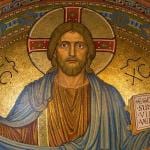
Atheist and anti-theist Bob Seidensticker, who was “raised Presbyterian”, runs the influential Cross Examined blog. He asked me there, on 8-11-18: “I’ve got 1000+ posts here attacking your worldview. You just going to let that stand? Or could you present a helpful new perspective that I’ve ignored on one or two of those posts?” He added in June 2017 in a combox: “If I’ve misunderstood the Christian position or Christian arguments, point that out. Show me where I’ve mischaracterized them.” Delighted to oblige his wishes . . .
Bob (for the record) virtually begged and pleaded with me to dialogue with him in May 2018, via email. But by 10-3-18, following massive, childish name-calling attacks against me, encouraged by Bob on his blog, he banned me from commenting there. I also banned him for violation of my rules for discussion, but (unlike him) provided detailed reasons for why it was justified.
Bob’s cowardly hypocrisy knows no bounds. On 6-30-19, he was chiding someone for something very much like he himself: “Spoken like a true weasel trying to run away from a previous argument. You know, you could just say, ‘Let me retract my previous statement of X’ or something like that.” Yeah, Bob could! He still hasn’t yet uttered one peep in reply to — now — 55 of my critiques of his atrocious reasoning.
Bible-Basher Bob’s words will be in blue. To find these posts, follow this link: “Seidensticker Folly #” or see all of them linked under his own section on my Atheism page.
*****
Bob tries to outdo even his own rock-bottom standards for Bible “exegesis” [choke] in his article, “Responding to “10 Myths About God” (2 of 3)” (11-26-14):
What you do see in the New Testament is the divinity of Jesus evolving with time. Sort the books chronologically and see the evolution. In Romans, Jesus was “appointed the Son of God” at his resurrection. In Mark, Jesus becomes divine earlier, at his baptism. In Matthew and Luke, it’s at his birth. And in John, since forever.
This is one of those hyper-ridiculous statements from atheists and Bob in particular, as an extraordinarily ignorant and self-deluded one, that makes a Christian apologist feel like a mosquito in a nudist camp: “where to begin?” But I shall barge ahead.
First, he spews this nonsense that the doctrine of Jesus evolves chronologically as the New Testament books are written. Like all good lies, this has a kernel of truth. All Christian doctrines develop, but that is a self-consistent notion, as opposed to the (not just biological) notion of evolution, where a thing can become a completely other thing. The latter does not occur in the New Testament, as regards the deity of Christ. He is always presented as God incarnate, and nothing in the New Testament denies that He is God in the flesh.
But let’s play Bob’s game for a moment and see what happens. I will deal with the Romans passage shortly. 2nd Thessalonians is one of the earliest New Testament books (estimated 52-53 AD), whereas Romans was written around 57-58. So, according to Bob, who thinks that Paul in Romans didn’t know that Jesus was God from all eternity (as indeed, God must be, by definition), 2 Thessalonians must have an even more primitive notion — and lack of knowledge and comprehension of — Jesus as God. But this is untrue. It teaches that Jesus judges the world in His Second Coming:
2 Thessalonians 1:7-8 (RSV) . . . when the Lord Jesus is revealed from heaven with his mighty angels in flaming fire, [8] inflicting vengeance . . .
2 Thessalonians 2:1-3, 8 Now concerning the coming of our Lord Jesus Christ and our assembling to meet him, we beg you, brethren, [2] not to be quickly shaken in mind or excited, either by spirit or by word, or by letter purporting to be from us, to the effect that the day of the Lord has come. [3] Let no one deceive you in any way; for that day will not come, unless the rebellion comes first, and the man of lawlessness is revealed, the son of perdition, . . . [8] And then the lawless one will be revealed, and the Lord Jesus will slay him with the breath of his mouth and destroy him by his appearing and his coming.
Now how does that prove He is necessarily God? Well, for one who (unlike Bible-Basher Bob) actually studies and understands the Bible, it is comprehended that the Old Testament teaches that it is God Who does this at the end of the age:
1 Samuel 2:10 …The LORD will judge the ends of the earth… (cf. Gen 18:25; 1 Chr 16:33; Ps 7:11; 9:8; 96:10; Is 2:4; 33:22)
Ecclesiastes 12:14 For God will bring every deed into judgment, with every secret thing, whether good or evil. (cf. 3:17; Ezek 18:30; 33:20; Joel 3:12)
Isaiah 11:4 …he shall smite the earth with the rod of his mouth, and with the breath of his lips he shall slay the wicked. [referring to the Messiah, Who is God]
Isaiah 40:10 Behold, the Lord GOD comes with might, and his arm rules for him; behold, his reward is with him, and his recompense before him. (cf. 40:5; Ps 96:13; 98:9)
Isaiah 66:15-16 For behold, the LORD will come in fire, and his chariots like the stormwind, to render his anger in fury, and his rebuke with flames of fire. [16] For by fire will the LORD execute judgment, and by his sword, upon all flesh; and those slain by the LORD shall be many. (cf. 59:20; Joel 2:11; Zech 2:10)
Conclusion: Jesus is God, and this is taught in 2 Thessalonians: one of the earliest book in the New Testament. There is no “evolution” in this respect. And that’s not the only evidence. Even more compelling is the fact that Jesus is called kurios (“Lord Jesus Christ”) 12 times in the book. This is, of course, calling Him God, since God the Father is called kurios many times in the New Testament. 1st Thessalonians was written at the same time and it also refers to “Lord Jesus Christ” or “Lord Jesus” another twelve times.
Yet Bob wants to pretend that St. Paul thinks Jesus became God at His Resurrection. He refers to this passage as his supposes “proof”:
Romans 1:4 and designated Son of God in power according to the Spirit of holiness by his resurrection from the dead, Jesus Christ our Lord,
The key to understanding this passage is the clause “in power.” The Greek scholar A. T. Robertson explains the passage:
Who was declared (tou orisqento). Articular participle (first aorist passive) of orizw for which verb see on Luke 22:22 ; Acts 2:23 . He was the Son of God in his preincarnate state ( 2 Corinthians 8:9 ; Philippians 2:6 ) and still so after his Incarnation (verse Romans 1:3 , “of the seed of David”), but it was the Resurrection of the dead (ex anastasew nekrwn, the general resurrection implied by that of Christ) that definitely marked Jesus off as God’s Son because of his claims about himself as God’s Son and his prophecy that he would rise on the third day. This event (cf. 1 Corinthians 15:1 ff.) gave God’s seal “with power” (en dunamei), “in power,” declared so in power ( 2 Corinthians 13:4 ). The Resurrection of Christ is the miracle of miracles. “The resurrection only declared him to be what he truly was” (Denney).
Greek linguist Marvin Vincent adds: “He was declared or instated mightily; in a striking, triumphant manner, through His resurrection.” So as usual, the passage Bob simply mentions as proof of his idiotic interpretations, means nothing of the sort. It basically means, “The resurrection proved that Jesus was Who He claimed to be [God].” And Jesus is again called kurios in the same manner as in the two epistles to the Thessalonians 18 times in this book as well. Both God the Father and God the Son, Jesus, are called kurios in one passage:
Romans 10:9-13 because, if you confess with your lips that Jesus is Lord and believe in your heart that God raised him from the dead, you will be saved. [10] For man believes with his heart and so is justified, and he confesses with his lips and so is saved. [11] The scripture says, “No one who believes in him will be put to shame.” [12] For there is no distinction between Jew and Greek; the same Lord is Lord of all and bestows his riches upon all who call upon him. [13] For, “every one who calls upon the name of the Lord will be saved.”
Romans 10:13 cites Joel 2:32: “And it shall come to pass that all who call upon the name of the LORD shall be delivered; for in Mount Zion and in Jerusalem there shall be those who escape, as the LORD has said, and among the survivors shall be those whom the LORD calls.” Thus, the NT is applying OT passages about God directly to Jesus.
Having disposed of this nonsense, let’s see what Bob thinks about the Gospels and the divinity of Jesus. He claims that in Mark, Jesus “becomes divine . . . at his baptism.“ Does the text support this? Nope:
Mark 1:9-11 In those days Jesus came from Nazareth of Galilee and was baptized by John in the Jordan. [10] And when he came up out of the water, immediately he saw the heavens opened and the Spirit descending upon him like a dove; [11] and a voice came from heaven, “Thou art my beloved Son; with thee I am well pleased.”
How in the world can any rational person think that this proves that Mark thought that Jesus became God at His baptism? God the Father simply calls Jesus His Son. So what! It would be like a new father (which one of my sons will become in less than two months) saying when his son was three months old: “this is my beloved son, who greatly pleases me” and someone interpreting that to mean that the child became his son at three months because he said that. It’s ridiculous; beneath contempt as an “argument.”
Bob claims that in Matthew and Luke Jesus “becomes divine . . . at his birth.” This is equally ludicrous. The texts say no such thing. They simply never do; and if Bob claims otherwise, then let him produce the text, instead of making his typical idiotic summary with no textual argument or serious exegetical effort. What Matthew does state is that Jesus’ birth is a fulfillment of Micah 5:2, which was understood by “all the chief priests and scribes” to refer to the Messiah (Christ in Greek: see Mt 2:1-6).
The New Testament citation of Micah 5:2 here doesn’t include its final portion: “whose origin is from of old, from ancient days.” The Hebrew word for “from ancient days” here (KJV: “from everlasting”) is olam; it’s often used to describe God the Father’s eternal existence (e.g., Ps 41:13; 90:2; 93:2; 106:48; Is 40:28). If this word means “eternal and uncreated” when applied to God the Father (YHWH), then it must mean the same thing when it is applied to Jesus. This shows that the Messiah, Who is God, was eternal, as does another famous Old Testament messianic passage:
Isaiah 9:6 For to us a child is born, to us a son is given; and the government will be upon his shoulder, and his name will be called “Wonderful Counselor, Mighty God, Everlasting Father, Prince of Peace.”
God the Father is also called “Mighty God” (the same phrase in Hebrew: El Gibbor): Dt 10:17; Neh 9:32; Is 10:21; Jer 32:18. The word for “everlasting,” ad, is applied to God the Father in Isaiah 57:15.
Jesus, then, obviously didn’t become God at His birth. Even though the final portion of Micah 5:2 wasn’t cited by Matthew, of course the Jews knew the entire passage, since it was a prominent messianic text. Matthew, like the other Gospels, consistently teaches that Jesus is God (therefore, eternal, since God is that by definition), as I showed at length in my reply yesterday to yet more errors and whoppers from Bob. If He’s eternal (which is made explicit in John, as even Bob admits), then He cannot have “become divine” at His birth.
As for Luke, proof is present showing that the author didn’t think Jesus became God when He was born, since Elizabeth, mother of John the Baptist calls him “Lord” (kurios) — which term is massively applied to God the Father also — even before He was born:
Luke 1:43 And why is this granted me, that the mother of my Lord should come to me?
As for Bob’s silly, goofy “chronological” view that the Bible only gradually comes to learn that Jesus is God, St. Paul wrote in Colossians: estimated to be written at the same time as Luke:
Colossians 1:15-17 He is the image of the invisible God, the first-born of all creation; [16] for in him all things were created, in heaven and on earth, visible and invisible, whether thrones or dominions or principalities or authorities — all things were created through him and for him. [17] He is before all things, and in him all things hold together.
The Greek for “firstborn” is prototokos, which means “preeminence” and “eternal preexistence,” according to Greek lexicons. It does not mean “first-created.” Apart from being untrue linguistically, this heretical interpretation is contradicted in the next two verses, which inform us that Christ “created all things,” and that He “is before all things.” The same book states about Jesus:
Colossians 2:9 For in him the whole fulness of deity dwells bodily,
Case closed. Another pitiful argument from Bob is exposed for the worthless piece of anti-biblical, anti-Christian lying propaganda that it is: ignorant, cynical, and plain old stupid.
***
Photo credit: Christ Crowned with Thorns (c. 1633-1639), by Matthias Stom (fl. 1615-1649) [public domain / Wikimedia Commons]
***













